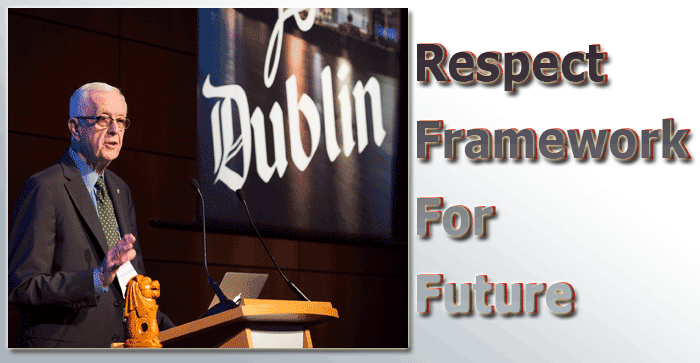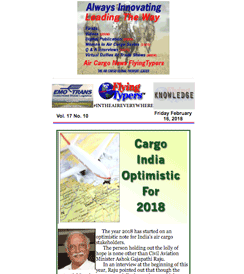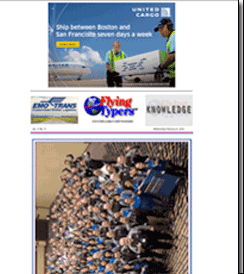 |
Geoffrey’s Keynote
FIATA World Cargo Symposium
October 7, 2016
Dublin, Ireland
FIATA and IATA are here—together again,
but for the first time, and all of us saw that.
What do you think?
I want to share a thought from the writings
of Kurt Vonnegut:
“Please notice when you are happy,
and exclaim or murmur or think at some point, 'If this isn't nice, I don't
know what is.’”
I would like to take this opportunity to
offer my thanks to FIATA for my designation as a FIATA Fellow.
The title is something I take very seriously
and I only hope to continue to earn your trust.
I think for anything to really work between
airlines and forwarders, both entities need to never forget to respect
each other.
American stand-up comedian Rodney Dangerfield
always began and ended his jokes with: “I get no respect.”
“I told my wife the truth. I told
her I was seeing a psychiatrist. Then she told me the truth: that she
was seeing a psychiatrist, two plumbers, and a bartender.
“I tell you I get no respect.
“I told my psychiatrist that everyone
hates me. He said I was being ridiculous - everyone hasn't met me yet.”
It is my firm belief that mutual respect
can drive cooperation in air cargo to untold heights.
It is an integral part of a new working
model that should be based on elevating dialogue between the factions
of the air cargo industry.
Respect should be a driver to IATA/FIATA
when exploring future possibilities.
How does one define success? Profits? Trust?
Reliability? Innovation?
One of the ways to measure these values
is by the respect they command. It's About The Customer
The central tenet of our collective endeavors
must be the much-mentioned customer.
That is the person for whom we all should
have respect.
For more than a decade in the B-to-C world,
a few clicks on a computer, tablet, or smart phone brought a product to
one’s doorstep with very little fuss. It's About Each Other
We need to keep that in mind when we cling
to “our” way of doing things.
In order to achieve seamless service we
should all have respect for one another’s needs and desires.
The forwarder-carrier partnership must continue
to mature and improve at a much faster pace than in the past in order
to provide a truly streamlined service to the customer.
Too many years of wasted debates and shadowboxing
have been allowed to continue so that one side or the other could feel
“in control.”
The customer can only get what it needs
and wants when a functionally integrated team of forwarders and carriers
provide the service and stand together to fix problems or develop a new
product.
This has been done, can be done, and must
be done.
It takes understanding of the challenge
and respect for roles and responsibilities.
Change At Warp Speed
The visionary Tesla CEO Elon Musk is investing
6 billion U.S. dollars in a state-of-the-art battery factory.
As leading edge as that is today, it will
be obsolete in 15 to 20 years.
When I think of air cargo, I believe that
a new business model should be developed: a stagnating global economy
combined with a seriously outdated system must eventually force fundamental
change.
Today we have an opportunity to rise above
the existing norms and jointly work as an industry on developing a new
paradigm of collaboration.
The clarion calls of do or die have been
sounded before and many have already paid the price for not heeding them.
It is not easy, simple, or without enormous
risk, but the “business as usual” approach carries even greater
risks today.
The best way we can move ahead and not stumble
is by having respect for the past, but working for the future.
It’s the old adage about history being
doomed to repeat itself.
It’s the famous James Baldwin line:
“If you know whence you came, there are no limitations to where
you can go.”
Learn From History
Let’s learn from our history so we
don’t make the same mistakes—let’s make new mistakes!
Learning from our history and each other
will seed innovation and growth in our industries, and will prove fruitful
and beneficial for both forwarders and airlines.
In my mind, bringing the forwarder and airline
people closer together is critical to the success of both.
So let me congratulate FIATA and IATA for
flying us into the future of air cargo through respectful and efficient
collaboration.
So with the memory of some younger days
that included Pat Phelan and John Hartnett, who both served as General
Manager Cargo for Aer Lingus, and my great, great grandmother Mary Doyle,
we fly into the future with IATA and FIATA as the wings of our flying
machine.
And if you will allow, because growing up
in New York City I heard these words often:
“Get on your knees and thank God you’re
still on your feet.”
Thank you. |




 Vol.
17 No. 10
Vol.
17 No. 10